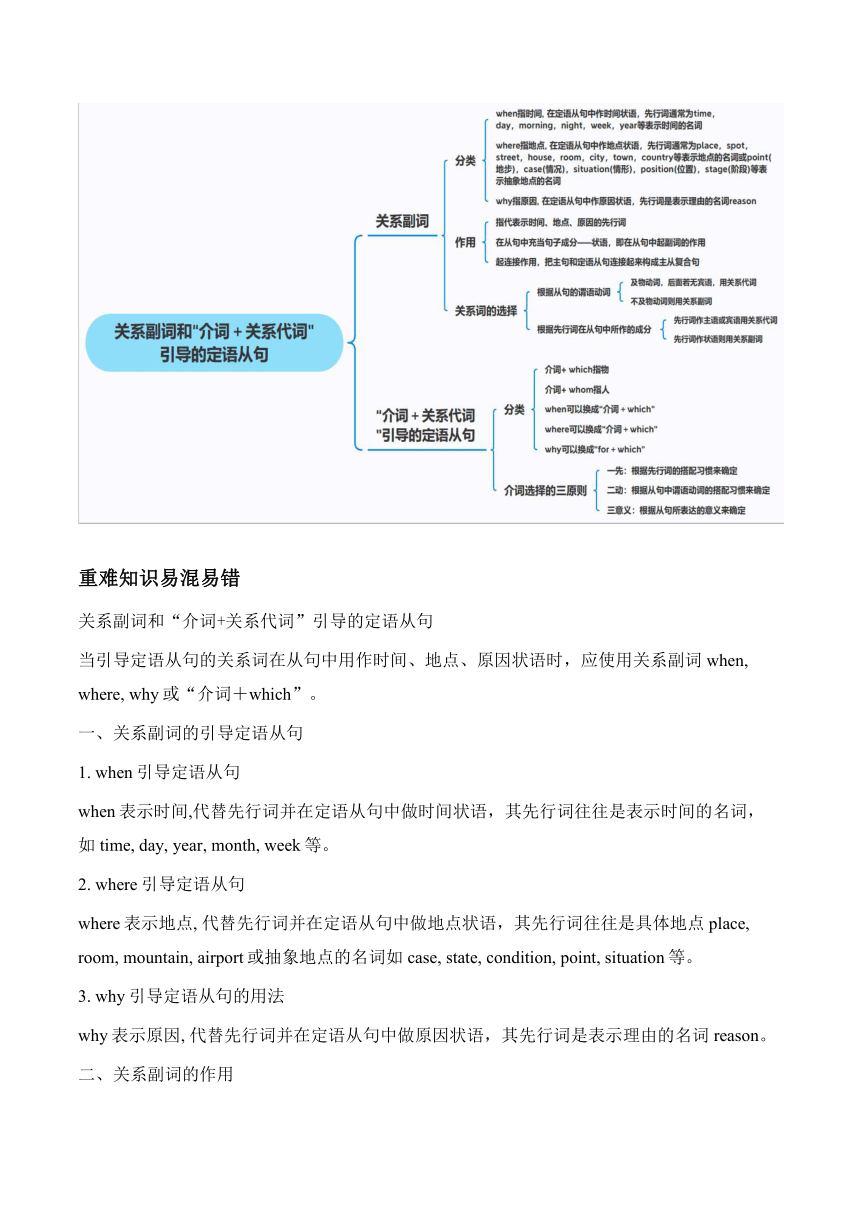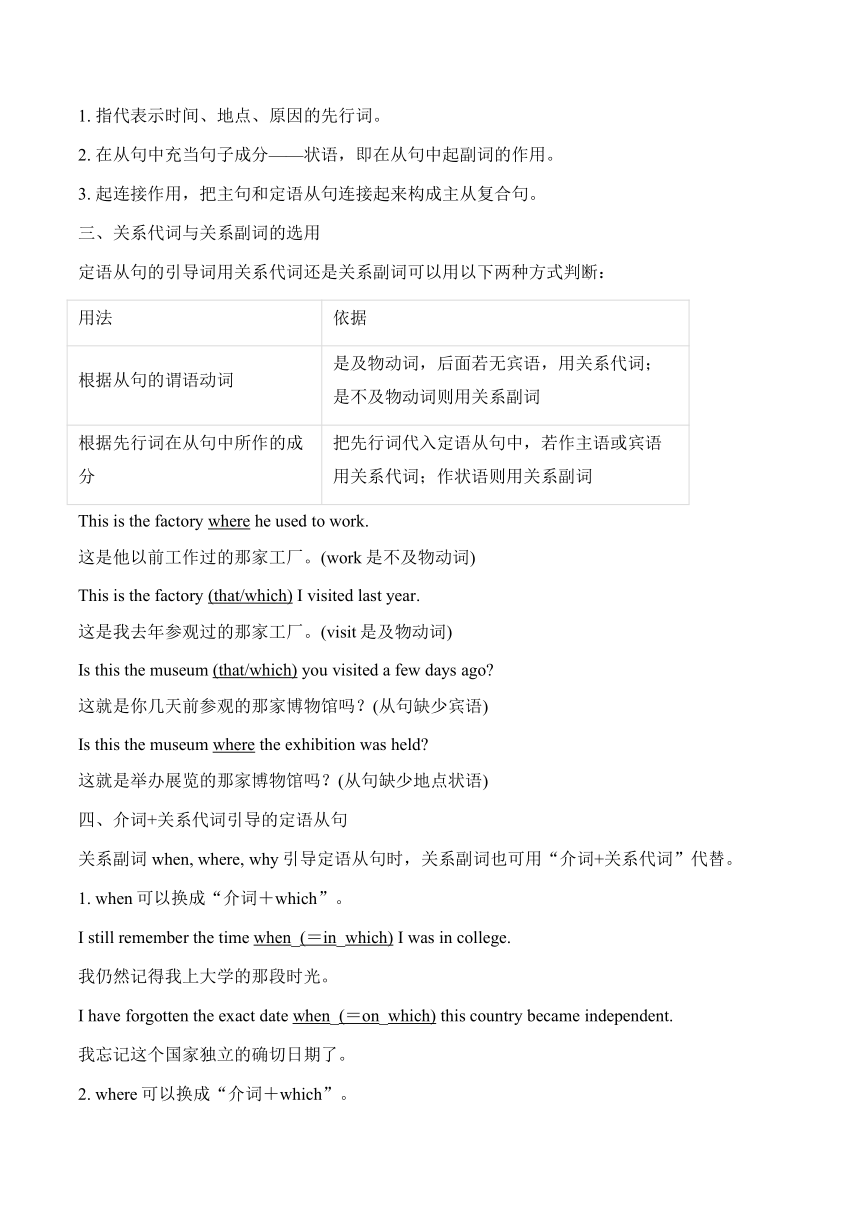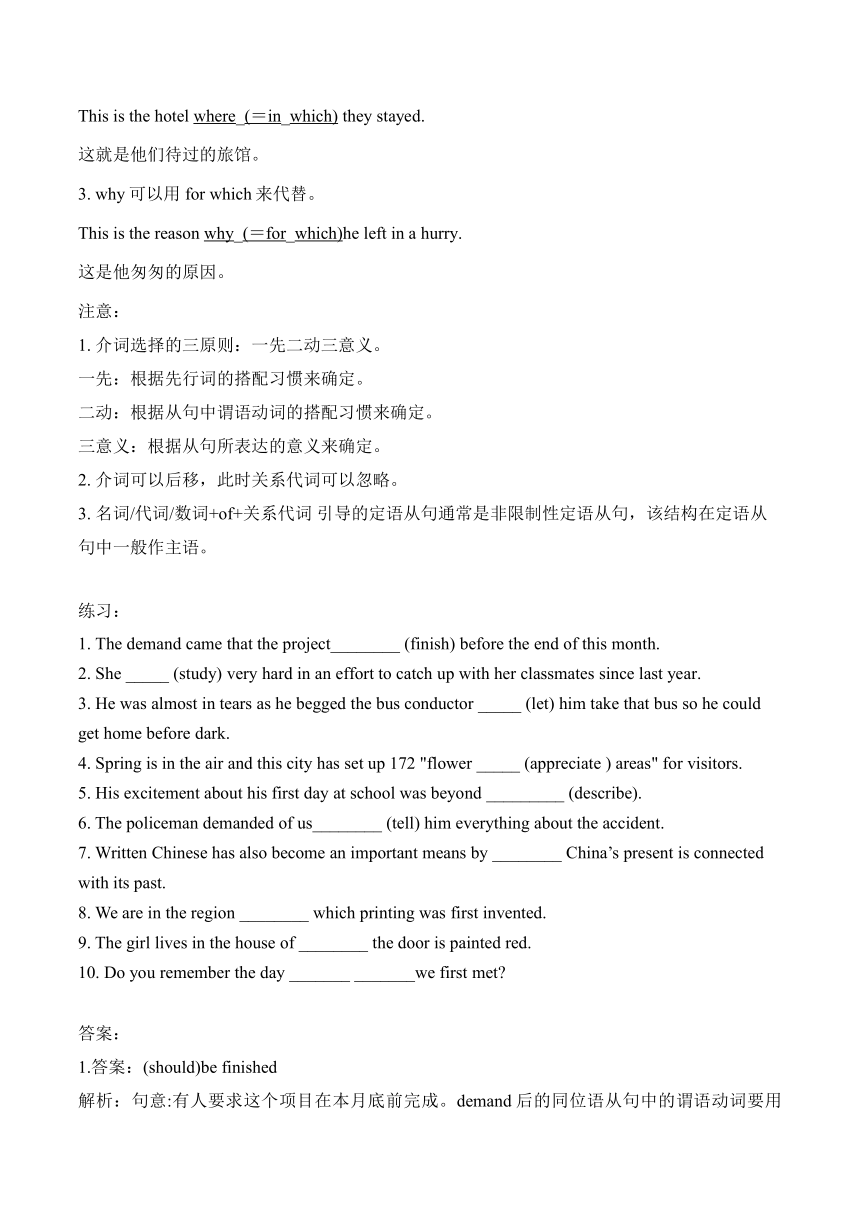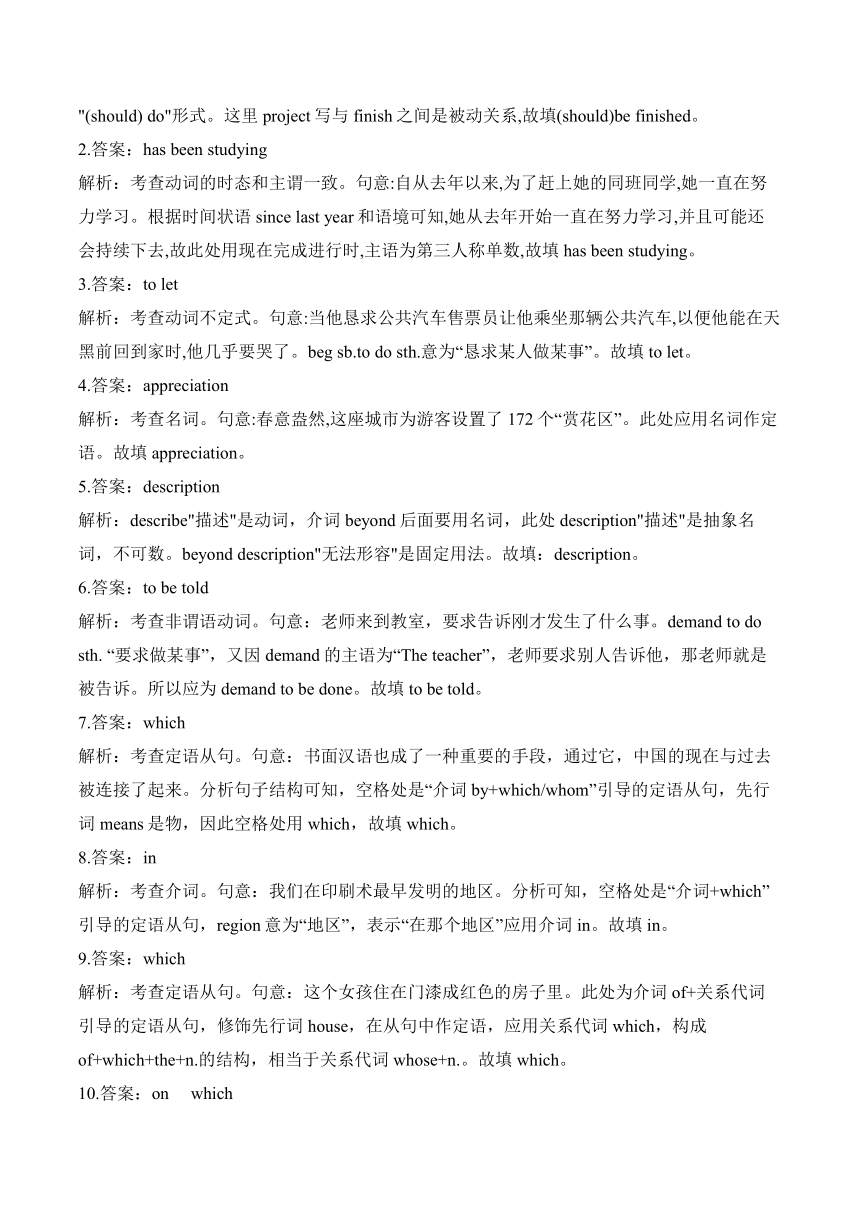人教版(2019)必修 第一册Unit 5 Languages Around the World 考点清单学案(含答案)
文档属性
| 名称 | 人教版(2019)必修 第一册Unit 5 Languages Around the World 考点清单学案(含答案) |

|
|
| 格式 | docx | ||
| 文件大小 | 271.9KB | ||
| 资源类型 | 教案 | ||
| 版本资源 | 人教版(2019) | ||
| 科目 | 英语 | ||
| 更新时间 | 2024-12-18 00:00:00 | ||
图片预览





文档简介
Unit 5 Languages Around the World考点清单
学习目标整合
language competence To improve listening, speaking, reading and writing abilities; To learn and understand some new word and expressions; To study and master the structure and usage of attributive clause; To learn the structure and language features of a blog about English study.
cultural awareness To understand the history of Chinese characters, the role of Chinese writing system in Chinese culture, the relationship between Chinese characters and the inheritance of Chinese culture, and actively think about the development and use of Chinese characters in the world in the future; To cultivate cultural awareness and enhance cultural confidence. To develop one's own cultural identity and preserve and promote one's own cultural traditions; To show a respectful and tolerant attitude toward different cultures, appreciate the uniqueness of different cultures, and demonstrate a positive attitude in intercultural communication.
thinking quality To understand and analyze the structure of the passage; To infer the meaning of words and expressions in the passage; To identify and analyze the grammar rules of attributive clause; To improve independent thinking and problem-solving skills; To improve critical thinking and creative thinking.
learning ability To master effective learning methods and develop good study habits; To improve independent learning, cooperative learning and inquiry-based learning abilities; To improve learning strategies, such as effective note-taking; To learn some communication strategies, such as clarification and paraphrasing; To enhance cooperation ability by working together with partners.
思维导图回顾知识
重难知识易混易错
关系副词和“介词+关系代词”引导的定语从句
当引导定语从句的关系词在从句中用作时间、地点、原因状语时,应使用关系副词when, where, why或“介词+which”。
一、关系副词的引导定语从句
1. when引导定语从句
when表示时间,代替先行词并在定语从句中做时间状语,其先行词往往是表示时间的名词,如time, day, year, month, week等。
2. where引导定语从句
where表示地点, 代替先行词并在定语从句中做地点状语,其先行词往往是具体地点place, room, mountain, airport或抽象地点的名词如case, state, condition, point, situation等。
3. why引导定语从句的用法
why表示原因, 代替先行词并在定语从句中做原因状语,其先行词是表示理由的名词reason。
二、关系副词的作用
1. 指代表示时间、地点、原因的先行词。
2. 在从句中充当句子成分——状语,即在从句中起副词的作用。
3. 起连接作用,把主句和定语从句连接起来构成主从复合句。
三、关系代词与关系副词的选用
定语从句的引导词用关系代词还是关系副词可以用以下两种方式判断:
用法 依据
根据从句的谓语动词 是及物动词,后面若无宾语,用关系代词;是不及物动词则用关系副词
根据先行词在从句中所作的成分 把先行词代入定语从句中,若作主语或宾语用关系代词;作状语则用关系副词
This is the factory where he used to work.
这是他以前工作过的那家工厂。(work是不及物动词)
This is the factory (that/which) I visited last year.
这是我去年参观过的那家工厂。(visit是及物动词)
Is this the museum (that/which) you visited a few days ago
这就是你几天前参观的那家博物馆吗?(从句缺少宾语)
Is this the museum where the exhibition was held
这就是举办展览的那家博物馆吗?(从句缺少地点状语)
四、介词+关系代词引导的定语从句
关系副词when, where, why引导定语从句时,关系副词也可用“介词+关系代词”代替。
1. when可以换成“介词+which”。
I still remember the time when_(=in_which) I was in college.
我仍然记得我上大学的那段时光。
I have forgotten the exact date when_(=on_which) this country became independent.
我忘记这个国家独立的确切日期了。
2. where可以换成“介词+which”。
This is the hotel where_(=in_which) they stayed.
这就是他们待过的旅馆。
3. why可以用for which来代替。
This is the reason why_(=for_which)he left in a hurry.
这是他匆匆的原因。
注意:
1. 介词选择的三原则:一先二动三意义。
一先:根据先行词的搭配习惯来确定。
二动:根据从句中谓语动词的搭配习惯来确定。
三意义:根据从句所表达的意义来确定。
2. 介词可以后移,此时关系代词可以忽略。
3. 名词/代词/数词+of+关系代词 引导的定语从句通常是非限制性定语从句,该结构在定语从句中一般作主语。
练习:
1. The demand came that the project________ (finish) before the end of this month.
2. She _____ (study) very hard in an effort to catch up with her classmates since last year.
3. He was almost in tears as he begged the bus conductor _____ (let) him take that bus so he could get home before dark.
4. Spring is in the air and this city has set up 172 "flower _____ (appreciate ) areas" for visitors.
5. His excitement about his first day at school was beyond _________ (describe).
6. The policeman demanded of us________ (tell) him everything about the accident.
7. Written Chinese has also become an important means by ________ China’s present is connected with its past.
8. We are in the region ________ which printing was first invented.
9. The girl lives in the house of ________ the door is painted red.
10. Do you remember the day _______ _______we first met
答案:
1.答案:(should)be finished
解析:句意:有人要求这个项目在本月底前完成。demand后的同位语从句中的谓语动词要用"(should) do"形式。这里 project写与finish之间是被动关系,故填(should)be finished。
2.答案:has been studying
解析:考查动词的时态和主谓一致。句意:自从去年以来,为了赶上她的同班同学,她一直在努力学习。根据时间状语since last year和语境可知,她从去年开始一直在努力学习,并且可能还会持续下去,故此处用现在完成进行时,主语为第三人称单数,故填has been studying。
3.答案:to let
解析:考查动词不定式。句意:当他恳求公共汽车售票员让他乘坐那辆公共汽车,以便他能在天黑前回到家时,他几乎要哭了。beg sb.to do sth.意为“恳求某人做某事”。故填to let。
4.答案:appreciation
解析:考查名词。句意:春意盎然,这座城市为游客设置了172个“赏花区”。此处应用名词作定语。故填appreciation。
5.答案:description
解析:describe"描述"是动词,介词beyond后面要用名词,此处description"描述"是抽象名词,不可数。beyond description"无法形容"是固定用法。故填:description。
6.答案:to be told
解析:考查非谓语动词。句意:老师来到教室,要求告诉刚才发生了什么事。demand to do sth. “要求做某事”,又因demand的主语为“The teacher”,老师要求别人告诉他,那老师就是被告诉。所以应为demand to be done。故填to be told。
7.答案:which
解析:考查定语从句。句意:书面汉语也成了一种重要的手段,通过它,中国的现在与过去被连接了起来。分析句子结构可知,空格处是“介词by+which/whom”引导的定语从句,先行词means是物,因此空格处用which,故填which。
8.答案:in
解析:考查介词。句意:我们在印刷术最早发明的地区。分析可知,空格处是“介词+which”引导的定语从句,region意为“地区”,表示“在那个地区”应用介词in。故填in。
9.答案:which
解析:考查定语从句。句意:这个女孩住在门漆成红色的房子里。此处为介词of+关系代词引导的定语从句,修饰先行词house,在从句中作定语,应用关系代词which,构成of+which+the+n.的结构,相当于关系代词whose+n.。故填which。
10.答案:on which
解析:考查定语从句。句意:你还记得我们第一次见面的那天吗?此处为“介词+关系代词”修饰先行词day,“在某一天”介词用on,作介词的宾语,指物,故用which。故填on which。
核心素养对接高考
一、阅读理解
A year ago, I paid no attention to English idioms(习语), though my teacher stressed the importance again and again. But soon, the importance of English idioms was shown in an amusing experience.
One day, I came across an Englishman on the road, and soon we began to talk. As I was talking about how I was studying English, the foreigner seemed to be astonished. Gently shaking his head, shrugging his shoulders, he said, "You don't say!" I was puzzled. I thought, it was likely that this was not an appropriate(适当的) type of topic. Well, I'd better change the topic. So I said to him, "Well, shall we talk about the Great Wall By the way, have you ever been there " "Certainly, everyone back home will laugh at me if I leave China without seeing it. It is magnificent." He was deep in thought when I began to talk like a tourist guide, "The Great Wall is one of the wonders in the world. We are very proud of it." Soon I was interrupted again by his words, "You don't say!" I couldn't help asking, "Why do you ask me not to talk about it "
"Well, I didn't request you to do so," he answered, greatly surprised. I said, "Didn't you say 'You don't say!' " Hearing this, the Englishman laughed to tears. He began to explain, " ‘You don't say!' actually means 'Really!'. It is an expression of surprise. Perhaps you don't pay attention to English idioms."
Only then did I realize I had made a fool of myself. Since then I have been more careful with idiomatic expressions.
1. Why did the author pay no attention to English idioms a year ago
A. Because English idioms were too difficult to master.
B. Because he did not realize the importance of them.
C. Because his teacher didn't show the importance of them.
D. Because he had no interest in English learning.
2. When the author first heard "You don't say!", what did he think
A. The Englishman was not interested in the topic.
B. The Englishman was only interested in the Great Wall.
C. He had talked too much.
D. He had to stop talking at once.
3. What can we infer from the second paragraph
A. The Englishman left China without seeing the Great Wall.
B. The Englishman wanted to see the Great Wall after the author talked about it.
C. The Englishman wanted the author to act as his guide.
D. The Englishman thought the Great Wall was worth visiting.
4. What happened after the Englishman explained the idiom
A. He made a fool of the author.
B. He made a fool of himself.
C. The author felt very silly.
D. The author felt proud of his understanding.
二、七选五
Learning anything by sitting in the comfort of your own home can be very easy and at the same time, there will not be any pressure to complete some tasks or anything like that.①_______Then there are many ways to learn it comfortably by sitting at your home.
Watch English movies and shows. Watching English movies can help you a lot in improving your spoken English skills. Observe the expressions of characters, which is an excellent way to improve your English conversations in daily life. ②_______Observe them when they speak every single word. This will help to improve your vocabulary.
Record your voice. Recording your voice can be an easy way to understand how you speak. This method can help you in understanding your accent (口音) and your pronunciation. You will be able to understand your mistakes when you speak. Then you can correct them. It may sound uncomfortable at the beginning. ③_______
Grasp(掌握) grammatical concepts. Having basic grammar knowledge is crucial (至关重要的).④_______If you don't have any grammar knowledge, you may find it difficult to construct proper sentences and it can lead to a lack of confidence whenever you speak. You should take related classes to improve your grasp of basic grammatical concepts and also try practicing various grammatical exercises.
⑤_______This can be an effective way to understand the way you speak including your facial expressions. Practicing your speech in front of a mirror can help encourage your confidence. This method is effective if you don't have a speaking partner or if there is no one to judge you.
A. Speak in front of a mirror.
B. Speak English with yourself.
C. It helps in forming correct sentences.
D. Similarly, maybe you are planning to learn English at home.
E. There is a lot of fun in the process and you will also enjoy it.
F. You can also watch English interviews of successful people.
G. But over time your accent and pronunciation will be improved by practicing.
三、书面表达
假定你是李华,你的英国朋友Tom将在寒假期间来中国交流学习。他学了两年中文,但仍然担心用中文交流时会遇到困难,写信向你求助。请你用英语给Tom回信,内容包括:
1. 宽慰对方;
2. 提出建议;
3. 期待收获。
注意:
1. 词数80左右;
2. 可适当增加细节,以使行文连贯。
______________________________________________________________________________________________________________________________________________________________________________________________________________________________________________________________________________________________________________________________________________________________________________________________________________________________________________________________________________________________________
答案以及解析
一、阅读理解
1.答案:B
解析:细节理解题。根据第一段可知,一年前作者不重视英语习语是因为作者没有意识到习语的重要性,故选B。
2.答案:A
解析:细节理解题。根据第二段中的“I was puzzled. I thought, it was likely that this was not an appropriate(适当的) type of topic.”可知,作者第一次听到“You don't say!”时,认为这个英格兰人对这个话题不感兴趣,故选A。
3.答案:D
解析:推理判断题。根据第二段中的“Certainly, everyone back home will laugh at me if I leave China without seeing it. It is magnificent.”可知,这个英格兰人认为没有看到长城就离开中国会被嘲笑。由此可推断出,这个英格兰人认为长城值得参观,故选D。
4.答案:C
解析:细节理解题。根据最后一段可知,在英格兰人解释了这个习语之后,作者感觉自己出丑了,故C项“作者觉得自己很愚蠢”符合题意。
二、七选五
答案:DFGCA
解析:①根据空前一句中的"Learning anything by sitting in the comfort of your own home"、空后一句和下文中的"Watch English movies and shows"可知,空处应提到在家学习英语。D项"同样地,也许你正打算在家里学英语"承上启下,空后一句中的 it指代D项中的English。故选D。
②根据本段的主旨句"Watch English movies and shows"和空前提到的"Watching English movies"可知,空处应围绕"watch English shows"展开,故F项"你也可以看成功人士的英文访谈"符合语境。空后的 them指代F项中的"successful people"。
③空前一句讲录下声音一开始听起来不太舒服。根据本段的主旨句和空处位于段尾可知,空处应强调录下声音的长远影响。故G项"但是随着时间的推移,你的口音和发音会通过练习得到提升"符合语境。
④空前一句讲掌握基本的语法知识是至关重要的,再根据空后一句可知,如果你没有任何语法知识,你可能会发现很难造出正确的句子,这可能会导致你在说话时缺乏自信。由此可知,空处应承接上文,说明掌握语法知识重要的原因是它与造句有关。故C项"它有助于造出正确的句子"符合语境,承上启下。
⑤根据本段中的" Practicing your speech in front of a mirror can help encourage your confidence"可知,本段建议在镜子前练习。故A项"对着镜子说话"符合语境。
三、书面表达
答案:
Dear Tom,
I feel sorry to learn that you are concerned about communicating in Chinese, so I'm writing to offer you some suggestions.
Knowing that speaking a foreign language requires courage, you're supposed to take it easy and never shy away from your confusion. Besides, proper gestures allow smoother communication, which can generally show your ideas together with what you say.
I do hope my proposal could be practical and I believe you'll gain a lot from your exchange study in China. Wish you good luck.
Yours,
Li Hua
学习目标整合
language competence To improve listening, speaking, reading and writing abilities; To learn and understand some new word and expressions; To study and master the structure and usage of attributive clause; To learn the structure and language features of a blog about English study.
cultural awareness To understand the history of Chinese characters, the role of Chinese writing system in Chinese culture, the relationship between Chinese characters and the inheritance of Chinese culture, and actively think about the development and use of Chinese characters in the world in the future; To cultivate cultural awareness and enhance cultural confidence. To develop one's own cultural identity and preserve and promote one's own cultural traditions; To show a respectful and tolerant attitude toward different cultures, appreciate the uniqueness of different cultures, and demonstrate a positive attitude in intercultural communication.
thinking quality To understand and analyze the structure of the passage; To infer the meaning of words and expressions in the passage; To identify and analyze the grammar rules of attributive clause; To improve independent thinking and problem-solving skills; To improve critical thinking and creative thinking.
learning ability To master effective learning methods and develop good study habits; To improve independent learning, cooperative learning and inquiry-based learning abilities; To improve learning strategies, such as effective note-taking; To learn some communication strategies, such as clarification and paraphrasing; To enhance cooperation ability by working together with partners.
思维导图回顾知识
重难知识易混易错
关系副词和“介词+关系代词”引导的定语从句
当引导定语从句的关系词在从句中用作时间、地点、原因状语时,应使用关系副词when, where, why或“介词+which”。
一、关系副词的引导定语从句
1. when引导定语从句
when表示时间,代替先行词并在定语从句中做时间状语,其先行词往往是表示时间的名词,如time, day, year, month, week等。
2. where引导定语从句
where表示地点, 代替先行词并在定语从句中做地点状语,其先行词往往是具体地点place, room, mountain, airport或抽象地点的名词如case, state, condition, point, situation等。
3. why引导定语从句的用法
why表示原因, 代替先行词并在定语从句中做原因状语,其先行词是表示理由的名词reason。
二、关系副词的作用
1. 指代表示时间、地点、原因的先行词。
2. 在从句中充当句子成分——状语,即在从句中起副词的作用。
3. 起连接作用,把主句和定语从句连接起来构成主从复合句。
三、关系代词与关系副词的选用
定语从句的引导词用关系代词还是关系副词可以用以下两种方式判断:
用法 依据
根据从句的谓语动词 是及物动词,后面若无宾语,用关系代词;是不及物动词则用关系副词
根据先行词在从句中所作的成分 把先行词代入定语从句中,若作主语或宾语用关系代词;作状语则用关系副词
This is the factory where he used to work.
这是他以前工作过的那家工厂。(work是不及物动词)
This is the factory (that/which) I visited last year.
这是我去年参观过的那家工厂。(visit是及物动词)
Is this the museum (that/which) you visited a few days ago
这就是你几天前参观的那家博物馆吗?(从句缺少宾语)
Is this the museum where the exhibition was held
这就是举办展览的那家博物馆吗?(从句缺少地点状语)
四、介词+关系代词引导的定语从句
关系副词when, where, why引导定语从句时,关系副词也可用“介词+关系代词”代替。
1. when可以换成“介词+which”。
I still remember the time when_(=in_which) I was in college.
我仍然记得我上大学的那段时光。
I have forgotten the exact date when_(=on_which) this country became independent.
我忘记这个国家独立的确切日期了。
2. where可以换成“介词+which”。
This is the hotel where_(=in_which) they stayed.
这就是他们待过的旅馆。
3. why可以用for which来代替。
This is the reason why_(=for_which)he left in a hurry.
这是他匆匆的原因。
注意:
1. 介词选择的三原则:一先二动三意义。
一先:根据先行词的搭配习惯来确定。
二动:根据从句中谓语动词的搭配习惯来确定。
三意义:根据从句所表达的意义来确定。
2. 介词可以后移,此时关系代词可以忽略。
3. 名词/代词/数词+of+关系代词 引导的定语从句通常是非限制性定语从句,该结构在定语从句中一般作主语。
练习:
1. The demand came that the project________ (finish) before the end of this month.
2. She _____ (study) very hard in an effort to catch up with her classmates since last year.
3. He was almost in tears as he begged the bus conductor _____ (let) him take that bus so he could get home before dark.
4. Spring is in the air and this city has set up 172 "flower _____ (appreciate ) areas" for visitors.
5. His excitement about his first day at school was beyond _________ (describe).
6. The policeman demanded of us________ (tell) him everything about the accident.
7. Written Chinese has also become an important means by ________ China’s present is connected with its past.
8. We are in the region ________ which printing was first invented.
9. The girl lives in the house of ________ the door is painted red.
10. Do you remember the day _______ _______we first met
答案:
1.答案:(should)be finished
解析:句意:有人要求这个项目在本月底前完成。demand后的同位语从句中的谓语动词要用"(should) do"形式。这里 project写与finish之间是被动关系,故填(should)be finished。
2.答案:has been studying
解析:考查动词的时态和主谓一致。句意:自从去年以来,为了赶上她的同班同学,她一直在努力学习。根据时间状语since last year和语境可知,她从去年开始一直在努力学习,并且可能还会持续下去,故此处用现在完成进行时,主语为第三人称单数,故填has been studying。
3.答案:to let
解析:考查动词不定式。句意:当他恳求公共汽车售票员让他乘坐那辆公共汽车,以便他能在天黑前回到家时,他几乎要哭了。beg sb.to do sth.意为“恳求某人做某事”。故填to let。
4.答案:appreciation
解析:考查名词。句意:春意盎然,这座城市为游客设置了172个“赏花区”。此处应用名词作定语。故填appreciation。
5.答案:description
解析:describe"描述"是动词,介词beyond后面要用名词,此处description"描述"是抽象名词,不可数。beyond description"无法形容"是固定用法。故填:description。
6.答案:to be told
解析:考查非谓语动词。句意:老师来到教室,要求告诉刚才发生了什么事。demand to do sth. “要求做某事”,又因demand的主语为“The teacher”,老师要求别人告诉他,那老师就是被告诉。所以应为demand to be done。故填to be told。
7.答案:which
解析:考查定语从句。句意:书面汉语也成了一种重要的手段,通过它,中国的现在与过去被连接了起来。分析句子结构可知,空格处是“介词by+which/whom”引导的定语从句,先行词means是物,因此空格处用which,故填which。
8.答案:in
解析:考查介词。句意:我们在印刷术最早发明的地区。分析可知,空格处是“介词+which”引导的定语从句,region意为“地区”,表示“在那个地区”应用介词in。故填in。
9.答案:which
解析:考查定语从句。句意:这个女孩住在门漆成红色的房子里。此处为介词of+关系代词引导的定语从句,修饰先行词house,在从句中作定语,应用关系代词which,构成of+which+the+n.的结构,相当于关系代词whose+n.。故填which。
10.答案:on which
解析:考查定语从句。句意:你还记得我们第一次见面的那天吗?此处为“介词+关系代词”修饰先行词day,“在某一天”介词用on,作介词的宾语,指物,故用which。故填on which。
核心素养对接高考
一、阅读理解
A year ago, I paid no attention to English idioms(习语), though my teacher stressed the importance again and again. But soon, the importance of English idioms was shown in an amusing experience.
One day, I came across an Englishman on the road, and soon we began to talk. As I was talking about how I was studying English, the foreigner seemed to be astonished. Gently shaking his head, shrugging his shoulders, he said, "You don't say!" I was puzzled. I thought, it was likely that this was not an appropriate(适当的) type of topic. Well, I'd better change the topic. So I said to him, "Well, shall we talk about the Great Wall By the way, have you ever been there " "Certainly, everyone back home will laugh at me if I leave China without seeing it. It is magnificent." He was deep in thought when I began to talk like a tourist guide, "The Great Wall is one of the wonders in the world. We are very proud of it." Soon I was interrupted again by his words, "You don't say!" I couldn't help asking, "Why do you ask me not to talk about it "
"Well, I didn't request you to do so," he answered, greatly surprised. I said, "Didn't you say 'You don't say!' " Hearing this, the Englishman laughed to tears. He began to explain, " ‘You don't say!' actually means 'Really!'. It is an expression of surprise. Perhaps you don't pay attention to English idioms."
Only then did I realize I had made a fool of myself. Since then I have been more careful with idiomatic expressions.
1. Why did the author pay no attention to English idioms a year ago
A. Because English idioms were too difficult to master.
B. Because he did not realize the importance of them.
C. Because his teacher didn't show the importance of them.
D. Because he had no interest in English learning.
2. When the author first heard "You don't say!", what did he think
A. The Englishman was not interested in the topic.
B. The Englishman was only interested in the Great Wall.
C. He had talked too much.
D. He had to stop talking at once.
3. What can we infer from the second paragraph
A. The Englishman left China without seeing the Great Wall.
B. The Englishman wanted to see the Great Wall after the author talked about it.
C. The Englishman wanted the author to act as his guide.
D. The Englishman thought the Great Wall was worth visiting.
4. What happened after the Englishman explained the idiom
A. He made a fool of the author.
B. He made a fool of himself.
C. The author felt very silly.
D. The author felt proud of his understanding.
二、七选五
Learning anything by sitting in the comfort of your own home can be very easy and at the same time, there will not be any pressure to complete some tasks or anything like that.①_______Then there are many ways to learn it comfortably by sitting at your home.
Watch English movies and shows. Watching English movies can help you a lot in improving your spoken English skills. Observe the expressions of characters, which is an excellent way to improve your English conversations in daily life. ②_______Observe them when they speak every single word. This will help to improve your vocabulary.
Record your voice. Recording your voice can be an easy way to understand how you speak. This method can help you in understanding your accent (口音) and your pronunciation. You will be able to understand your mistakes when you speak. Then you can correct them. It may sound uncomfortable at the beginning. ③_______
Grasp(掌握) grammatical concepts. Having basic grammar knowledge is crucial (至关重要的).④_______If you don't have any grammar knowledge, you may find it difficult to construct proper sentences and it can lead to a lack of confidence whenever you speak. You should take related classes to improve your grasp of basic grammatical concepts and also try practicing various grammatical exercises.
⑤_______This can be an effective way to understand the way you speak including your facial expressions. Practicing your speech in front of a mirror can help encourage your confidence. This method is effective if you don't have a speaking partner or if there is no one to judge you.
A. Speak in front of a mirror.
B. Speak English with yourself.
C. It helps in forming correct sentences.
D. Similarly, maybe you are planning to learn English at home.
E. There is a lot of fun in the process and you will also enjoy it.
F. You can also watch English interviews of successful people.
G. But over time your accent and pronunciation will be improved by practicing.
三、书面表达
假定你是李华,你的英国朋友Tom将在寒假期间来中国交流学习。他学了两年中文,但仍然担心用中文交流时会遇到困难,写信向你求助。请你用英语给Tom回信,内容包括:
1. 宽慰对方;
2. 提出建议;
3. 期待收获。
注意:
1. 词数80左右;
2. 可适当增加细节,以使行文连贯。
______________________________________________________________________________________________________________________________________________________________________________________________________________________________________________________________________________________________________________________________________________________________________________________________________________________________________________________________________________________________________
答案以及解析
一、阅读理解
1.答案:B
解析:细节理解题。根据第一段可知,一年前作者不重视英语习语是因为作者没有意识到习语的重要性,故选B。
2.答案:A
解析:细节理解题。根据第二段中的“I was puzzled. I thought, it was likely that this was not an appropriate(适当的) type of topic.”可知,作者第一次听到“You don't say!”时,认为这个英格兰人对这个话题不感兴趣,故选A。
3.答案:D
解析:推理判断题。根据第二段中的“Certainly, everyone back home will laugh at me if I leave China without seeing it. It is magnificent.”可知,这个英格兰人认为没有看到长城就离开中国会被嘲笑。由此可推断出,这个英格兰人认为长城值得参观,故选D。
4.答案:C
解析:细节理解题。根据最后一段可知,在英格兰人解释了这个习语之后,作者感觉自己出丑了,故C项“作者觉得自己很愚蠢”符合题意。
二、七选五
答案:DFGCA
解析:①根据空前一句中的"Learning anything by sitting in the comfort of your own home"、空后一句和下文中的"Watch English movies and shows"可知,空处应提到在家学习英语。D项"同样地,也许你正打算在家里学英语"承上启下,空后一句中的 it指代D项中的English。故选D。
②根据本段的主旨句"Watch English movies and shows"和空前提到的"Watching English movies"可知,空处应围绕"watch English shows"展开,故F项"你也可以看成功人士的英文访谈"符合语境。空后的 them指代F项中的"successful people"。
③空前一句讲录下声音一开始听起来不太舒服。根据本段的主旨句和空处位于段尾可知,空处应强调录下声音的长远影响。故G项"但是随着时间的推移,你的口音和发音会通过练习得到提升"符合语境。
④空前一句讲掌握基本的语法知识是至关重要的,再根据空后一句可知,如果你没有任何语法知识,你可能会发现很难造出正确的句子,这可能会导致你在说话时缺乏自信。由此可知,空处应承接上文,说明掌握语法知识重要的原因是它与造句有关。故C项"它有助于造出正确的句子"符合语境,承上启下。
⑤根据本段中的" Practicing your speech in front of a mirror can help encourage your confidence"可知,本段建议在镜子前练习。故A项"对着镜子说话"符合语境。
三、书面表达
答案:
Dear Tom,
I feel sorry to learn that you are concerned about communicating in Chinese, so I'm writing to offer you some suggestions.
Knowing that speaking a foreign language requires courage, you're supposed to take it easy and never shy away from your confusion. Besides, proper gestures allow smoother communication, which can generally show your ideas together with what you say.
I do hope my proposal could be practical and I believe you'll gain a lot from your exchange study in China. Wish you good luck.
Yours,
Li Hua
